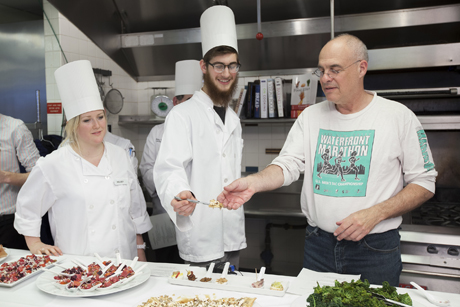Philosophy students serve up the ethics of eating
By Blaine Friedlander

Among Cornell's philosophy courses, this one tastes best.
Contemplating concepts like sustenance grown nearby and global dietary choices, students from the Ethics of Eating course (Philosophy 2411) turned local food into a feast March 7 for New York Times food columnist Mark Bittman.
Using only ingredients found within 35 miles of Ithaca, students skilled at cooking created dishes worthy of fine dining. The students in the new University Course used the Statler Hall teaching kitchens.
Teaching the course, the professors sought to open minds on eating matters around the world. Said Will Starr, Cornell assistant professor of philosophy: "By cooking a meal with local ingredients, the students could see what it takes. Is it better for the environment? Better for the local economy? We just wanted to illustrate the options."
Andrew Chignell, associate professor and co-editor of the forthcoming book "Philosophy Comes to Dinner," explained: "There are many ethical issues related to eating -- animal welfare issues, sustainability issues, class issues, health issues and so on. We thought it would be good to have the students dealing with actual food as they think through these questions and discuss them with Bittman and others. We're grateful to the School of Hotel Administration for giving a bunch of philosophy types the opportunity to cook in this world-class facility," he said.
Frederique Verly '13, Phaedra Randolph '13 and Teresa Xu '15 prepared roasted parsnips and carrots, obtained from Stick and Stone Farm, Ulysses, N.Y. The students used sunflower oil from Full Circle Farms, Nichols, N.Y., and parsley from Sean Gannon's (Two Tables Catering) garden. Upon seeing the plated vegetables, Bittman remarked, "They're gorgeous. You can't go wrong. This is great always."
Alexander Orfanos '13 created beer-braised pulled pork from meat obtained from The Piggery, Ithaca. For a dipping sauce, Orfanos reduced Apricot Wheat beer from the Ithaca Beer Co., added honey and coarse mustard. The class sampled the mouthwatering meat. Bittman's opinion:"Very nice. Very classic."
A roasted-beet and blue cheese salad was prepared by Kelsey Graeber '14. In the salad, she included goat cheese from Livery Run Goat Dairy, Interlaken, N.Y., and Cabernet Franc Verjus, a zippy lemon-like juice, from Red Newt Cellars, Hector, N.Y.
With his smartphone, Bittman took a picture of sophomore Benjamin Sacks' maple sugar popcorn cookies, made from New York state maple sugar; milk and butter from the Ithaca Milk Co.; flour from Cayuga Pure Organics, Brooktondale, N.Y.; and eggs from Meadowbrook Farms, Seneca Falls, N.Y. In fact, Norm Sacks, from Rochester, N.Y., visited son Benjamin for the special class. Bittman's judgment on the concoction: "I'm totally intrigued by this. This cookie needs some work, but it has some promise."
Bittman, a visiting Sevin Fellow through the West Campus Visiting Fellows Program, was in Ithaca for four days, providing public lectures and talking privately to Cornell classes. At the Kitchen Theater, he spoke to the Ithaca community, and at Cornell he discussed "Conscious and Mindless Eating," with professor Brian Wansink, from the Dyson School of Applied Economics and Management. For the Ethics of Eating class earlier in the week, Bittman talked about his writing.
After the Thursday afternoon session, Bittman attended a small dinner party at the Hans Bethe House. Among the topics: the decline of cooking at home, world customs around food and Bittman's appreciation for fast-food franchise restaurant Taco Bell -- with their many vegetarian and vegan options.
Media Contact
Get Cornell news delivered right to your inbox.
Subscribe